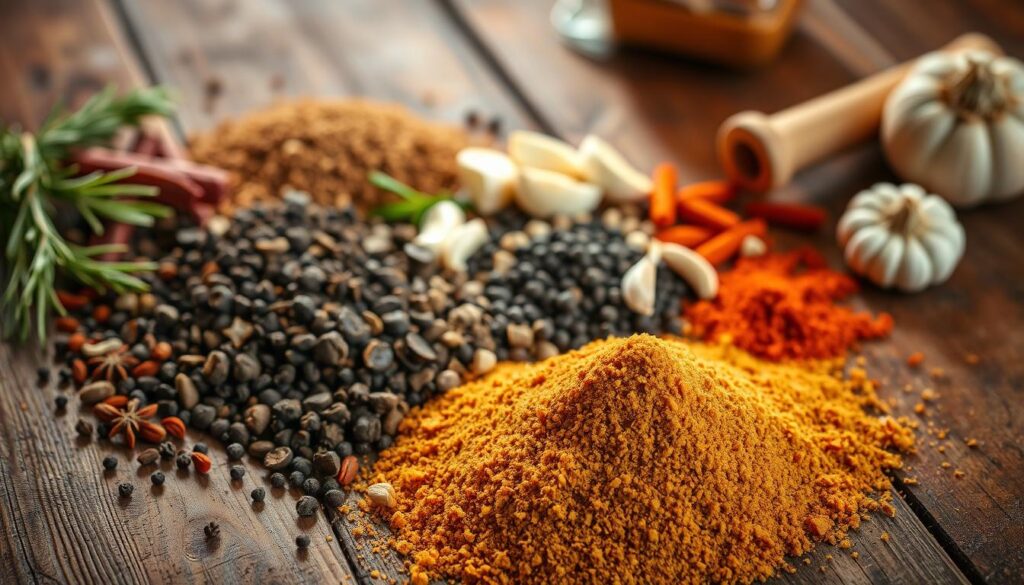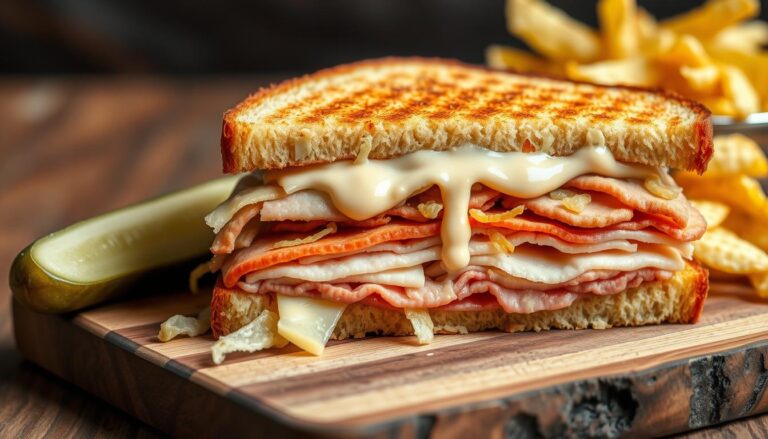Ultimate Turkey Rub Recipes for Smoking Success
Every Thanksgiving, my family looks forward to the smoked turkey. It’s golden-brown with a crispy, flavorful outside. The secret is a special turkey rub that makes the turkey amazing.
Smoking a turkey is more than cooking; it’s an art. It needs precision, passion, and the right spices. Whether you’re a backyard BBQ fan or a pitmaster, the right spices can make your feast unforgettable.
This guide will explore turkey rub recipes for smoking. We’ll look at techniques to make your turkey a flavor-packed centerpiece that everyone will remember.
Table of Contents
Understanding the Basics of Turkey Rubs for Smoking
Learning how to season a turkey starts with mastering the art of a great smoked turkey dry rub. This journey to flavor excellence begins with knowing the key elements that turn a regular turkey into a feast for the senses.
Spicing a turkey is more than just throwing together spices. It’s about creating a mix that boosts the meat’s natural taste and makes it irresistible.
Essential Spice Components
A top-notch turkey rub has a special mix of ingredients:
- Kosher salt (primary flavor enhancer)
- Sugar (for caramelization)
- Herbs and spices (complexity and depth)
- Paprika (color and mild heat)
- Black pepper (classic seasoning)
The Science Behind Flavor Penetration
Flavor penetration is key in smoking turkey. The right dry spices create a protective layer. This layer keeps moisture in and adds deep, rich flavors to the meat.
“Seasoning is the secret language of great cooking” – Professional BBQ Pitmaster
Why Proper Seasoning Matters
Proper seasoning can turn an ordinary turkey into a memorable dish. The right rub can make your smoked turkey go from good to unforgettable. It adds layers of flavor that excite your taste buds.
| Seasoning Type | Flavor Profile | Best Used With |
|---|---|---|
| Sweet BBQ Rub | Mild, Caramelized | Pecan Wood Smoking |
| Herb Blend | Fresh, Aromatic | Olive Oil Basting |
| Spicy Creole | Bold, Intense | High-Heat Grilling |
Pro tip: Try out different spice mixes to create your own unique smoked turkey dry rub!
Classic Smoky BBQ Turkey Rub Recipe
Making the perfect turkey rub is an art. It turns a regular turkey into a smoky, flavorful dish. This classic BBQ turkey rub recipe will make your turkey taste amazing and impress your guests.
Ingredients for Your Turkey Rub
- 4 tbsp smoked paprika
- 3 tbsp brown sugar
- 3 tbsp salt flakes
- 2 tbsp finely ground black pepper
- 1 tbsp dried thyme
- 1 tbsp dried rosemary
- 1 tbsp mustard powder
- 1 tbsp garlic powder
- 1 tbsp onion powder
When making your turkey rub, be precise. Mix all ingredients well in a bowl. This mix gives your turkey a perfect balance of sweet, smoky, and savory flavors.
“A great turkey rub is like a symphony of flavors – each ingredient plays a crucial role in creating the perfect taste experience.”
Nutritional Breakdown and Application
| Nutritional Component | Amount per Serving |
|---|---|
| Calories | 345 kcal |
| Total Carbohydrates | 74g |
| Protein | 10g |
| Total Fat | 7g |
For the best results, use 3-4 tablespoons of rub on a 12-pound turkey. Let it sit for at least 30 minutes before smoking. This lets the flavors soak into the meat.
Storage and Usage Tips
- Store homemade spice rub in an airtight container
- Use within 3 months for optimal flavor
- Keep in a cool, dry place
- Recommended for turkeys weighing 7-16 pounds
Your homemade turkey rub seasoning recipe is now ready. It will turn your next smoked turkey into a culinary masterpiece!
Preparing Your Turkey for the Perfect Rub Application
To get your turkey ready for smoking, you need to prepare it carefully. The right steps can turn an ordinary turkey into a feast. Pitmasters know that the key to a great meal is in the turkey’s preparation.
Before you add your spices, follow some important steps. You want to make sure your turkey is ready for the rub.
Proper Cleaning and Surface Preparation
First, clean your turkey well. Take out the giblets and dry the bird with paper towels. This helps the spices stick better.
- Remove turkey from packaging
- Rinse under cold water
- Pat completely dry with clean paper towels
- Inspect for any remaining feathers
Temperature and Timing Considerations
Temperature is key when preparing your turkey. Let your turkey rest at room temperature for about an hour before seasoning.
| Preparation Step | Time Required | Purpose |
|---|---|---|
| Resting at Room Temperature | 60 minutes | Ensures even seasoning absorption |
| Patting Dry | 5-10 minutes | Removes excess moisture |
| Initial Preparation | 15-20 minutes | Complete pre-rub setup |
Seasoning Application Techniques
Pro tip: Lightly coat the turkey with olive oil or melted butter before applying the rub. This helps the spices stick and gives a golden-brown look.
“The secret to an amazing smoked turkey is in the preparation and seasoning.” – Professional Pitmaster
Apply your rub generously, making sure to cover the whole turkey. Rub the seasonings into every part for the best flavor.
Turkey Rub Recipes for Smoking: Master Collection

Turning a regular turkey into a flavorful masterpiece needs the right seasoning. Since 60% of turkey lovers prefer smoked turkey, getting the seasoning right is key.
Start your journey to the best turkey seasoning by learning about flavors and ingredients. A great turkey seasoning rub can make your smoked turkey truly special.
Classic Herb-Infused Turkey Rub
- 2 tablespoons dried rosemary
- 2 tablespoons dried thyme
- 1 tablespoon kosher salt
- 1 tablespoon black pepper
- 1 teaspoon garlic powder
Pro Tip: Crush dried herbs between your fingers to release maximum flavor before mixing.
Spicy Southwest Turkey Rub
- 3 tablespoons smoked paprika
- 2 tablespoons chili powder
- 1 tablespoon cumin
- 1 tablespoon brown sugar
- 2 teaspoons cayenne pepper
“Seasoning is the secret language of great cooking” – Unknown Chef
| Rub Type | Flavor Profile | Recommended Smoking Temperature |
|---|---|---|
| Classic Herb | Mild, Earthy | 225-250°F |
| Spicy Southwest | Bold, Spicy | 250-275°F |
For an amazing smoked turkey, balance flavors and know your rub’s ingredients. Try different mixes to find your unique turkey seasoning rub.
Buttermilk Brine and Rub Combination Technique
To take your turkey recipes spices to the next level, you need more than just seasoning. The buttermilk brine technique is a game-changer. It makes your smoked turkey juicy and full of flavor, impressing even the toughest barbecue critics.
Professional pitmasters know the secret to a perfect turkey dry rub. A buttermilk brine is the key. It adds moisture and complex flavors to your bird before you add the best seasoning for turkey.
Essential Brine Ingredients and Precise Ratios
To make a top-notch buttermilk brine, you’ll need these ingredients:
- 1 gallon buttermilk
- 8 oz chicken broth
- ½ cup kosher salt
- 2 tablespoons brown sugar
- ¼ cup black pepper
Combining Brining with Dry Rub Techniques
The magic happens when you mix brining with a well-made dry rub. Professional chefs say to soak your turkey for at least 18 hours for the best flavor. After brining, dry the turkey and apply your dry rub. It should include:
- 1 teaspoon garlic powder
- 1 tablespoon smoked paprika
- ½ cup kosher salt
*”The key to an unforgettable smoked turkey is patience and precise seasoning techniques.”*
Pro tip: Keep your smoker at 325-350°F. Smoke a 12-14 lb turkey for about 6 hours. The turkey should reach 170°F. Then, let it rest for 5-10 minutes to seal in the flavors.
Herb-Forward Traditional Turkey Seasoning Blend

Creating the perfect seasoned turkey recipes starts with understanding the art of herb blending. Traditional turkey spices turn an ordinary bird into a culinary masterpiece. It will impress your guests and tantalize their taste buds.
When crafting your spicy turkey rub, focus on classic herbs that have stood the test of time. The core of a traditional herb blend typically includes:
- Dried thyme
- Fresh rosemary
- Crumbled sage leaves
- Chopped parsley
- Kosher salt
- Freshly ground black pepper
The key to an exceptional herb blend is balancing flavors. Fresh herbs provide brighter notes, while dried herbs offer concentrated intensity. A pro tip is to crush dried herbs between your fingers before mixing. This releases their essential oils and maximizes flavor potential.
“The secret to an unforgettable turkey is not just in the cooking, but in the seasoning.” – Chef Michael Thompson
When preparing your blend, consider mixing herbs with complementary flavor profiles. A tablespoon of lemon zest can brighten the entire mixture. It adds a citrusy complexity that cuts through the richness of the turkey.
Remember that your herb blend should be applied generously. Apply it both under and over the skin. This ensures deep flavor penetration during smoking or roasting.
Spicy Cajun-Style Turkey Rub Variation
Give your Thanksgiving turkey a bold twist with a Cajun-inspired rub. This seasoning brings the vibrant flavors of Louisiana to your table. A good rub can turn a simple turkey into a feast with just the right spices.
Making the perfect Cajun rub is all about the spice mix. It’s a blend that captures the essence of Cajun cooking. Here’s what you need:
- Paprika (for deep red color and mild heat)
- Cayenne pepper (for intense spiciness)
- Garlic powder
- Onion powder
- Dried oregano
- Dried thyme
- Kosher salt
- Black pepper
Heat Level Adjustments
One of the best things about homemade Cajun rub is you can adjust the heat. Start with a little cayenne and add more if you like it spicier.
Regional Spice Combinations
Louisiana has its own spice variations. Some recipes add:
- White pepper for extra warmth
- Dried mustard for tangy complexity
- Smoked paprika for deeper flavor
“A great Cajun rub is about balancing heat with depth of flavor.” – Louisiana Cooking Tradition
For the best flavor, rub your turkey well and let it sit in the fridge for 24-48 hours. This lets the spices soak in, making your Cajun turkey a hit with your guests.
Storage and Shelf Life of Homemade Turkey Rubs

Making a tasty spice rub for turkey breast needs careful storage. Your homemade thanksgiving turkey spices should be kept fresh. A good smoked turkey rub recipe stays flavorful when stored right.
Keeping your spice blends in top shape is key. Use airtight glass or heavy-duty plastic containers to keep them dry. Store them in a cool, dark place, away from sunlight and heat.
- Store at room temperature for up to 3 months
- Freeze for extended preservation up to 6 months
- Keep away from humidity and direct light
- Use clean, dry utensils when handling
Look out for signs that your spice blend is going bad. Fresh rubs should look vibrant, smell strong, and flow easily. If it clumps, changes color, or loses scent, it’s time for a new batch.
| Storage Method | Duration | Recommended Conditions |
|---|---|---|
| Room Temperature | 3 months | Airtight container, cool dark place |
| Freezer Storage | 6 months | Sealed vacuum-packed container |
Pro tip: Add a few grains of rice to your container to absorb moisture and prevent clumping.
Your homemade spice blend is a reflection of your creativity. By following these storage tips, your turkey rub will stay as tasty as the day you made it.
Professional Tips for Rub Application Techniques
Learning to apply a smoked turkey dry rub recipe can make your turkey stand out. The right way to apply the rub ensures deep flavor and a delicious crust. This will wow your guests.
Precision in Under-Skin Application
Applying your best turkey rub recipe needs care. Start by gently pulling the turkey skin away from the meat with your fingers. Do this slowly to avoid ripping the skin. This makes a space for the rub to spread the flavor.
- Use clean hands to carefully lift the skin
- Move fingers gently to create space without damaging membrane
- Spread the best dry rub recipe for turkey evenly beneath the skin
Even Distribution Strategies
It’s important to season the turkey evenly for great flavor. Pat the turkey dry before applying the rub. This helps the rub stick better. Sprinkle the rub all over, covering both the outside and under the skin.
“The secret to an incredible smoked turkey is in the details of your rub application.” – Pitmaster Pro
Pro tip: For the best taste, apply your smoked turkey dry rub recipe 2-4 hours before smoking. This lets the seasonings soak into the meat. It also helps create a tasty crust while it cooks.
Troubleshooting Common Turkey Rub Challenges
Smoking a perfect turkey needs skill and focus. When figuring out what seasoning to put on turkey, many face tough challenges. These can ruin what could have been a great meal.
Knowing what to season a turkey with is just the start. Let’s look at some common smoking problems and how to fix them:
- Uneven Rub Distribution: Make sure the turkey is dry before rubbing. Rub the seasoning into the skin gently and evenly.
- Burning Rub During Smoking: Smoke at a lower temperature. Also, use a protective liquid spray to avoid burning.
- Lack of Flavor Penetration: Rub the turkey under the skin for better flavor.
“The secret to a perfect smoked turkey is patience and precision in seasoning.” – Culinary Experts
Most problems come from bad technique, not bad ingredients. Keep an eye out for these signs of trouble:
| Challenge | Potential Cause | Solution |
|---|---|---|
| Dry Meat | Overcooking | Watch the internal temperature closely |
| Bland Flavor | Not enough seasoning | Try a stronger spice mix |
| Burnt Rub | Too high smoker temperature | Keep it between 225-250°F |
By knowing these common issues, you can make your turkey smoking better. Remember, the more you practice, the better you’ll get at seasoning turkey.
Conclusion
Exploring turkey rub recipes for smoking is a journey. It takes practice to get it right. Each smoked turkey is a chance to improve and make unforgettable meals.
Start by learning about the right ingredients and how to use them. This is the first step in seasoning your turkey.
Creating great spices for turkey means trying new flavors. You might like a classic mix or something spicy. Your unique touch is what makes it special. Check out unique seasoning techniques to take your turkey to the next level.
Smoking temperatures should be between 225°F and 250°F. Ideal turkey weights are 12 to 14 pounds. With these tips, you can make a turkey that rivals restaurant quality.
Keep learning and stay curious about smoking turkeys. Your skills will grow with each try. Soon, what seemed hard will become fun and rewarding.







